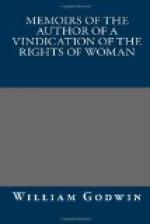Thus circumstanced, a proposal was made her, such as, regarding only the situations through which she had lately passed, is usually termed advantageous. This was, to accept the office of governess to the daughters of lord viscount Kingsborough, eldest son to the earl of Kingston of the kingdom of Ireland. The terms held out to her were such as she determined to accept, at the same time resolving to retain the situation only for a short time. Independence was the object after which she thirsted, and she was fixed to try whether it might not be found in literary occupation. She was desirous however first to accumulate a small sum of money, which should enable her to consider at leisure the different literary engagements that might offer, and provide in some degree for the eventual deficiency of her earliest attempts.
The situation in the family of lord Kingsborough, was offered to her through the medium of the rev. Mr. Prior, at that time one of the under masters of Eton school. She spent some time at the house of this gentleman, immediately after her giving up the school at Newington Green. Here she had an opportunity of making an accurate observation upon the manners and conduct of that celebrated seminary, and the ideas she retained of it were by no means favourable. By all that she saw, she was confirmed in a very favourite opinion of her’s, in behalf of day-schools, where, as she expressed it, “children have the opportunity of conversing with children, without interfering with domestic affections, the foundation of virtue.”
Though her residence in the family of lord Kingsborough continued scarcely more than twelve months, she left behind her, with them and their connections, a very advantageous impression. The governesses the young ladies had hitherto had, were only a species of upper servants, controlled in every thing by the mother; Mary insisted upon the unbounded exercise of her own discretion. When the young ladies heard of their governess coming from England, they heard in imagination of a new enemy, and declared their resolution to guard themselves accordingly. Mary however speedily succeeded in gaining their confidence, and the friendship that soon grew up between her and Margaret King, now countess Mount Cashel, the eldest daughter, was in an uncommon degree cordial and affectionate. Mary always spoke of this young lady in terms of the truest applause, both in relation to the eminence of her intellectual powers, and the ingenuous amiableness of her disposition. Lady Kingsborough, from the best motives, had imposed upon her daughters a variety of prohibitions, both as to the books they should read, and in many other respects. These prohibitions had their usual effects; inordinate desire for the things forbidden, and clandestine indulgence. Mary immediately restored the children to their liberty, and undertook to govern them by their affections only. The consequence was, that their indulgences were moderate, and they were uneasy under any indulgence that had not the sanction of their governess. The salutary effects of the new system of education were speedily visible; and lady Kingsborough soon felt no other uneasiness, than lest the children should love their governess better than their mother.




